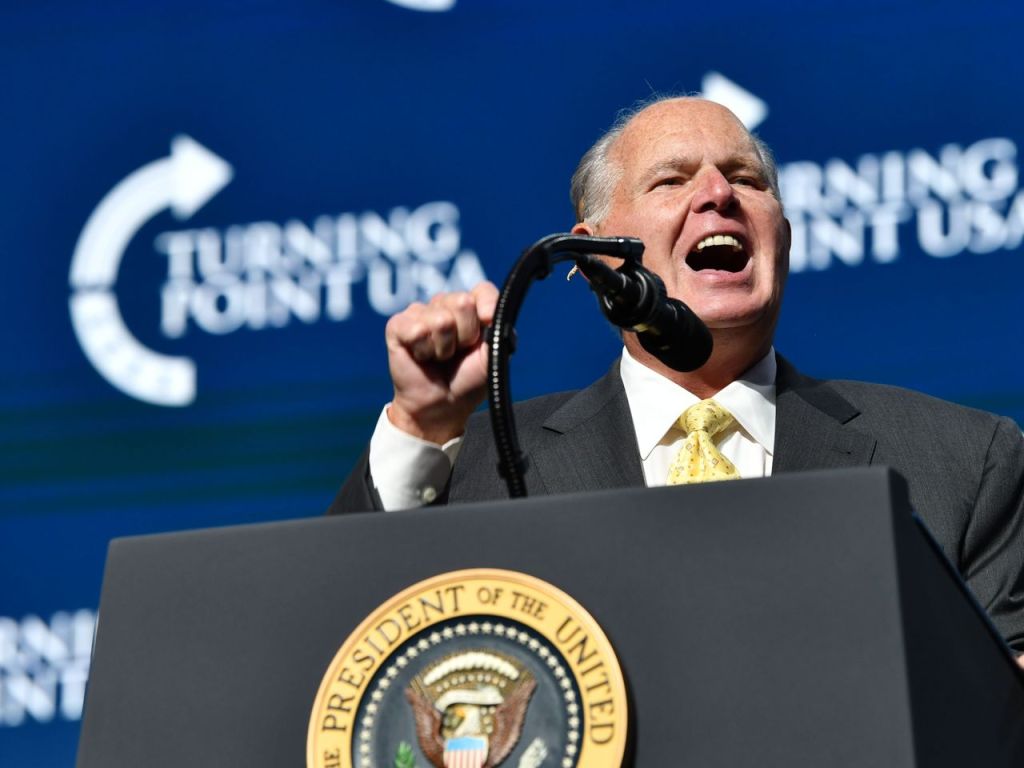It’s the second anniversary of Rush Limbaugh’s death. On the occasion of his passing from lung cancer, I posted a remembrance on my Facebook newsfeed. It rather surprised people because I’m a Marxist and my politics are antagonistic to the man who probably represented the most unabashedly pro-capitalist voice in this history of talk radio. But I admire talent, and Limbaugh had a lot of it. Moreover, he was my companion in my morning commutes from my tiny cinderblock apartment in Knoxville, Tennessee to the University of Tennessee where I was obtaining my PhD. He was my companion for many years before that. And many year after. Indeed, I listened to Limbaugh from the beginning of his national syndication to the very end of his life. I’m reproducing the gist of that remembrance here for posterity. I have added detail in honor of the Great One.

Rightwing radio exploded the year I restarted my undergraduate career in 1988. Thanks to the rescinding of the FCC Fairness Doctrine the previous year, popular program was no longer bounded by arbitrary constraints on free speech. Reagan vetoed an attempt by Congress to preempt the inevitable end of the Doctrine in June 1987. In August of that year, under the leadership of FCC Chairman Dennis Patrick, the FCC abolished the doctrine by a 4–0 vote. The ruling was upheld by a panel of the Appeals Court for the DC Circuit, in February 1989. Democrats tried to reimpose the Doctrine in `1991, but George H. W. Bush threatened to veto the legislation. The Democrats backed down.
My mornings started out with a progressive Democrat for three hours, her gorgeous voice projected out of Nashville, Talk Radio 98.3/1510 WLAC. I’m pretty sure her name was Ruth Ann Harnish. A progressive true believer, Harnish was self-righteous and scolding and routinely owned by callers. I mean no disrespect, but the Doctrine sustained her. I admired her courage, of course. She took calls. In the buckle of the Bible Belt. Progressives always had trouble making it on AM radio (and FM radio, for that matter). That’s because progressives are joy eaters. Soon, she was cancelled.
Before she was cancelled, when she was done, Rush Limbaugh came on—for another three hours. The Rush Limbaugh Show was nationally syndicated on AM and FM radio stations in 1988. He defined right-wing radio.
Soon AM was rightwing radio day and night. Not exactly, but by progressive standards. However, one of the best of the other shows at the time was the Chuck Harder show, “For The People,” based in White Springs, Florida. Starting in 1987, working out of Tampa, often with Pat Choate as cohost, Harder had founded several networks, including the People’s Radio Network and the I.E. America Radio Network, the later bankrolled by the United Auto Workers.
Harder, a left-leaning populist—a fair-trade protectionist waging a war of resistance against the NAFTA/GATT globalist agenda—gave a platform to economic nationalists. Harder fought for the people who Hillary Clinton would years later called the “deplorables,” the average American worker who was losing their manufacturing jobs thanks to the globe-trotting transnationalist corporation.
Opposing outsourcing and exporting of jobs, plant closings and foreign relocations, mass immigration, especially the influx of illegals and porous borders, Harder was a forerunner of Steve Bannon and his crowd. His show laid a lot of the groundwork for the Ross Perot campaign and the formation Reform Party. Ravi Batra would come on. Ralph Nader, too. Later, in the 1990s, Donald Trump became a political player by working the same crowd.
Chuck Harder died on April 10, 2018 from heart failure at age 74. As long as his voice was available, I sought it out.
Yes, I listened to it all. In graduate school, in Knoxville, in the second half of the 1990s, Limbaugh and the parade of AM right and left wing populists were a way to get my head out of the international political economy and postcolonial studies—and the emerging ideologies of critical race theory and queer theory—that would come to be known as woke politics.
Obviously, I didn’t agree with most of the things Limbaugh said, but he was entertaining and I was impressed by his ability to talk cogently for three hours straight five days a week. I learned a lot from him about what my conservative friends and family think about the world.
Love him or hate him, agree or disagree with him, Limbaugh changed America. He paved the wave for the populist-nationalist movement that synthesized his spirit with the working class politics of voices like Chuck Harder. I didn’t know it then, but I sure know it now: Limbaugh was saving the republic.

Rush Limbaugh speaks at the December 2019 Student Action Summit hosted by Turning Point USA in West Palm Beach, Florida.
